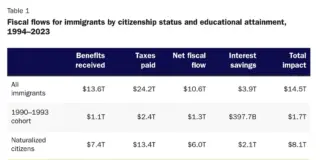Students enter the Pfizer trailer for an “escape-room-like” experience, working with Pfizer employees on a pandemic tabletop exercise ending in how to make a vaccine to distribute globally. “It just feels so wrong,” one critic — a teacher — told The Defender.
Pharmaceutical giant Pfizer is crossing the country with a mobile science “escape room” — complete with a robotic dog — to provide students in rural communities with a “science-based learning experience.”
In the process, students are “exposed to a multi-national company” and they get to meet Pfizer employees.
In its promotional video for the “School of Science Mobile Experience,” students in rural Sanford, North Carolina, are greeted by a Pfizer robot dog, which makes several appearances during their field trip.
Students enter the Pfizer mobile trailer for a “fantastic, interactive, escape-room-like experience,” where they work with Pfizer employees to solve a mystery about a pandemic outbreak that starts with people showing up in doctor’s offices with scaly, lizard-like skin.
As they move through the pandemic tabletop exercise, proceeding through different rooms in the trailer, the children learn different lessons. They learn about antigens in one room, about vaccine manufacturing in another, and more.
In the end, the students “successfully produced a remedy that will be distributed around the world” — reminiscent of Pfizer’s own production of the COVID-19 vaccines.
“This is not your typical science class,” a Pfizer spokesperson says, closing out the video.
North Carolina mother Beth Secosky told The Defender she wouldn’t want Pfizer teaching science to her children or anyone’s children.
“Pfizer has paid billions in penalties for false claims and safety violations,” she said. “Why would schools invite a corporation that is notorious for putting profits over people to teach their children ‘science’?”
Michael Kane, New York City educator and founder of Teachers for Choice told The Defender he was struck by the fact that the experience would highlight antigens and manufacturing as part of science education for young people.
“It’s definitely crossing a line from education to directly marketing or promoting their products to kids,” he said. “It just feels so wrong.”
The hands-on learning modality is great for kids learning, Kane added, but even in the short video, it’s clear this is just an attempt to promote their vaccines. “It kind of blows me away.”
The robotic dog was especially concerning, Kane said. Police departments across the country and the world have controversially begun deploying robot dogs to surveil citizens with cameras, sensors and microphones and militaries are starting to weaponize them for military applications by mounting them with machine guns.
“They are bringing these dogs to the kids in such a disarming way — showing how cute this robotic dog is when it looks precisely like the dogs that they’re putting out into police departments and into the military,” he said. “That is very frightening in terms of what they’re programming these children to be used to and to think is cool, and to think is normal.”
The video was released a couple of weeks ago. The comment function for the video on Pfizer’s YouTube channel is turned off, so viewers have not been able to share their thoughts.
‘School of Science’ fully funded by Pfizer
The mobile escape room is a project of the Pfizer School of Science, which brings middle school students to Pfizer’s headquarters in New York City, where Pfizer teaches them 90-minute courses on topics like artificial intelligence in healthcare, the history of vaccines and how they protect against epidemics and drug discovery and manufacturing.
Pfizer pays for all of it.
On Pfizer’s flagship New York campus, middle-schoolers get to wear lab coats and goggles and listen to Pfizer employees promote possible future careers.
As of early 2024, Pfizer CEO Albert Bourla reported on LinkedIn the program had brought more than 6,000 students from New York City schools to its headquarters. The program targets students from “diverse backgrounds,” which is a refrain across the promotional materials.
“In some cases, this meant modifying our coursework to accommodate diverse needs, such as customizing classes to suit different learning abilities and language capabilities,” he wrote.
Pfizer’s promotional celebration of “science” to younger generations as part of its strategy to also promote the company was on display in its Super Bowl ad in January. The 60-second ad — and an extended 90-second cut — featured famous scientists throughout history singing along to Queen’s “Don’t Stop Me Now,” Fierce Pharma reported.
Drew Panayiotou, the company’s chief marketing officer said the “iconic Queen song … cuts across generations with the words ‘don’t stop me now,’ which is a great line for Pfizer.”
From childrenshealthdefense.org
Disclaimer: We at Prepare for Change (PFC) bring you information that is not offered by the mainstream news, and therefore may seem controversial. The opinions, views, statements, and/or information we present are not necessarily promoted, endorsed, espoused, or agreed to by Prepare for Change, its leadership Council, members, those who work with PFC, or those who read its content. However, they are hopefully provocative. Please use discernment! Use logical thinking, your own intuition and your own connection with Source, Spirit and Natural Laws to help you determine what is true and what is not. By sharing information and seeding dialogue, it is our goal to raise consciousness and awareness of higher truths to free us from enslavement of the matrix in this material realm.
 EN
EN FR
FR



























